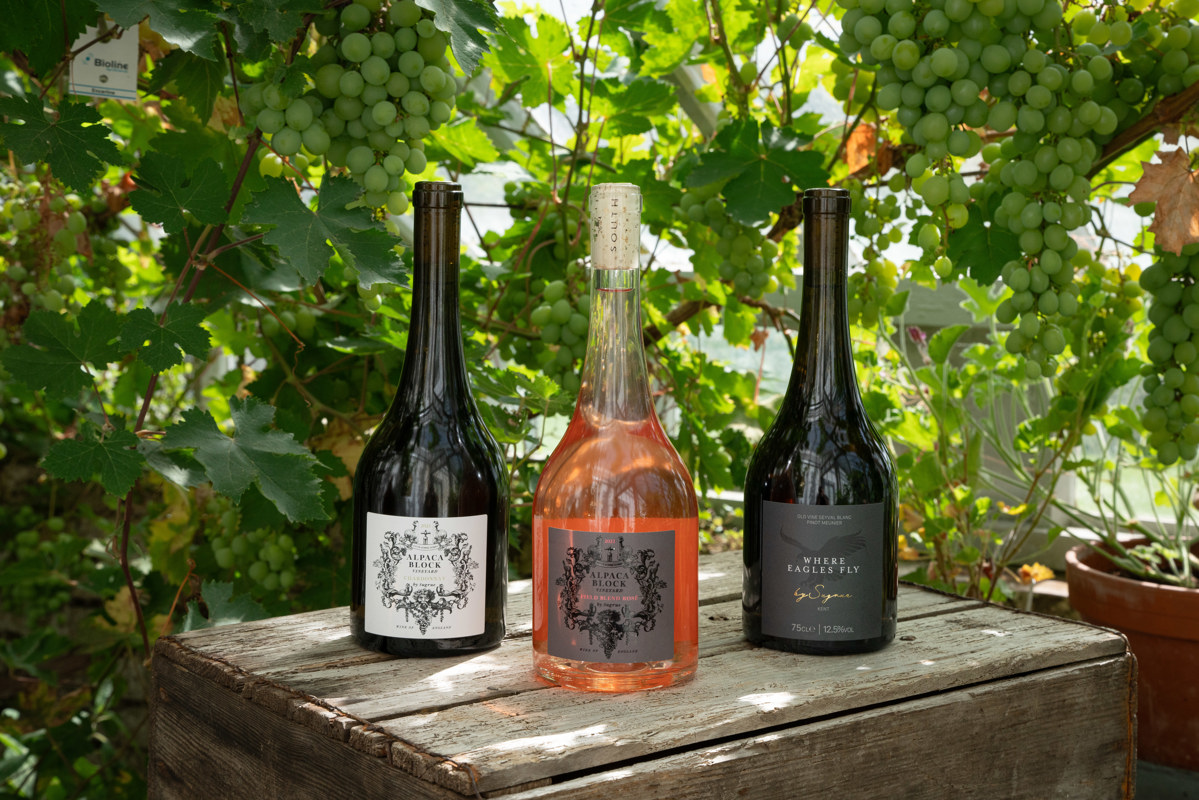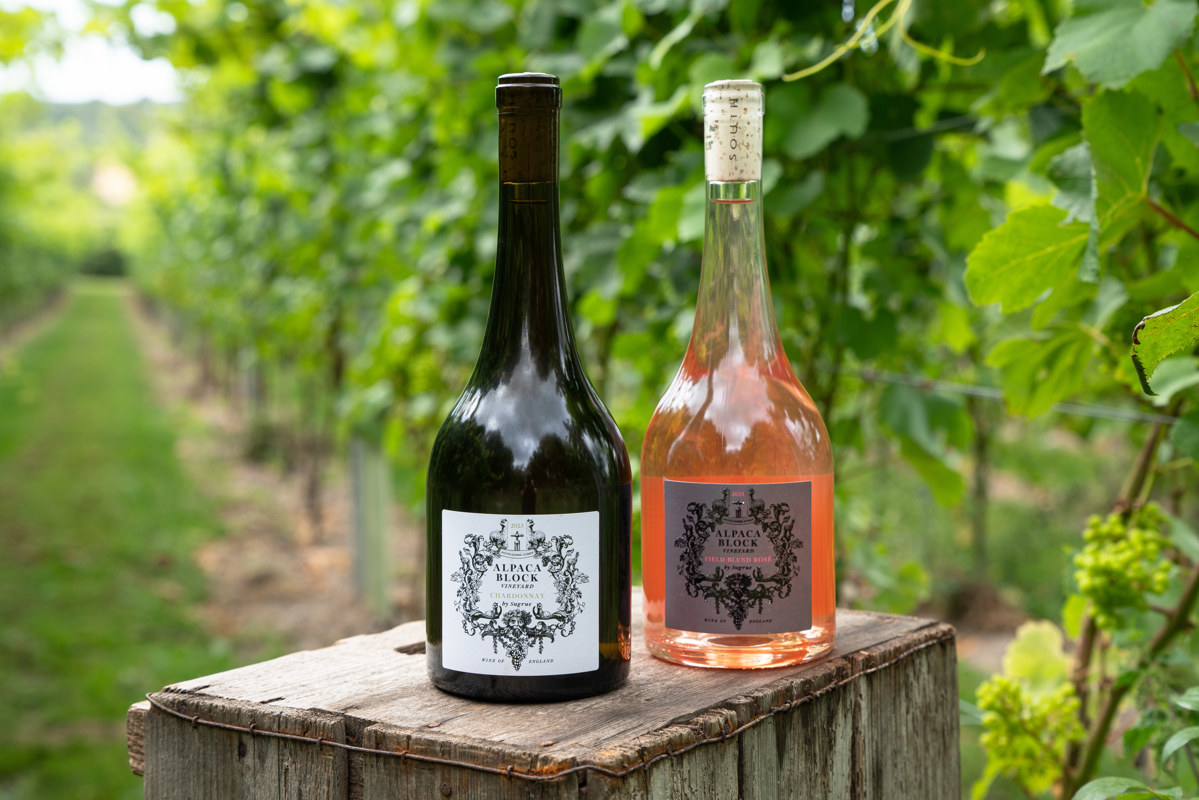We couldn’t be more excited to share three brand-new wines with you! Grown from our very own vineyards, it’s a bit of a dream come true moment for us…
Once a field in the South Downs where alpacas used to graze and fertilise the land beneath them, now it’s home to our very first vineyard and our very first homegrown wines: Alpaca Block Chardonnay and Alpaca Block Field Blend Rosé!
Before opening THE PIG-in the South Downs in 2021 our teams planted over 4,000 vines of Chardonnay, Pinot Noir, Pinot Meunier and a few rows of Gamay in this ideal, sheltered, chalk site. Our first vineyard in the South Downs was a passion project of our Chairman Robin Hutson – a serious wine enthusiast at heart who had a long hankering to make wine in the UK.
Roll on several years later of nurturing from THE PIG-in the South Downs’ garden and wine team, our vines yielded over a whopping 3.1 tonnes of grapes in the first-ever harvest of October 2023. The grapes were handed to Dermot and Ana Sugrue - of Sugrue South Downs fame - to weave their magic on the inaugural vintage of what would soon become, Alpaca Block wines.
But that’s not the only new homegrown wine we have to share… With the help from Dermot, we have been able to breathe a new lease of life into the original Seyval Blanc vines found on the grounds of our new PIG, THE PIG-at Groombridge in Kent, and these harvested grapes now form the backbone of “Where Eagles Fly”. This is a wine that our team are very proud of, and the name honours the beautiful birds of prey housed in the Owl & Raptor Centre on the site of Groombridge Place. The eagles, in particular, are often seen flying directly over the vines. Dermot made them.

Alpaca Block Chardonnay
The wine Robin, Dermot, and Ana absolutely wanted to make, based on the fruit being suitable, was a still white oak-aged Chardonnay; using the vast majority of Chardonnay grapes we harvested, which were picked last.
Two harvests took place in 2023, the first was Pinot Noir, Pinot Meunier and Gamay; and the Chardonnay was left to hang for around a week, to gain as much ripeness as possible. It was so important to pick it at just the right time - leaving it to ripen for as long as possible, but just before bad weather comes and potentially destroys the crop - and we managed to get it just right!
Style & Production:
The remit was to make something with that ripeness, that was punchy, spending time in oak barrels; but, soft on the palate, to tame back the acidity which is naturally high in Chardonnay. A combination of old 600L barrels for 60% of the wine, and new oak barrels for the other 40% worked very well.
It was left in barrels until June this year to allow malolactic fermentation (the process by which bacteria convert malic acid into lactic acid and carbon dioxide). This brought a creaminess to the wine, whilst removing the sharp acidity.
The new oak has brought sensations of oak flavours and given structure, and the old oak allows it to be more supple and open, as more oxidation happens in older barrels. The use of the two provides a nice biting point and creates a very modern style. It's fragrant and has a good ability to age (the rosé has too).
Tasting Notes:
This chardonnay captivates with its nose of lemon curd, honey, walnut, and freshly squeezed lime. On the palate, it is lively and fresh, supported by a serious backbone coming from the oak; combining richness with a refreshing vibrancy.

Alpaca Block Field Blend Rosé
We set out to produce a 'field blend' rosé, as we wanted to make a wine that was a real reflection of what was planted in the vineyard; combining all the grape varieties that are there - Pinot Noir (primarily), with Pinot Meunier supporting that, and what we'd describe only as 'seasoning' of Chardonnay, and a 'whisper' of Gamay. By doing this, this wine has a real sense of place to it.
Robin, Dermot, and Ana also decided they didn't want to make a typical Provence rosé, in terms of colour and style. Whilst hugely popular, they wanted to produce something with a little more character, both visually, and the intensity of the wine - and in contrast to what a lot of other wine producers are doing these days.
Style & Production:
The style fits those who like dry, fresh, pale pink rosé, but also those who want a bit of character and are looking for something slightly different. Its lovely pink coral colour suggests how fresh the wine is.
One of the key things was to build some texture into the wine, and this was done by using barrels. Large 600L old (4-5 years) barrels primarily, which make up 20-25% of the production of this wine. They don't deliver any oak flavour, but they deliver a creamy, deeper texture. The rest of the wine was fermented in stainless steel, which preserves the vivid fruit character.
The results are a combination of the two, plus a little 'seasoning' in this wine, which comes from a small amount of Chardonnay fermented in small, new oak barrels; just a tiny element of the wine, which comes from the Alpaca Block Chardonnay, to polish the blend. It's not very perceptible on the nose or palate, but it does give an added dimension of complexity.
Tasting Notes:
You’ll be met with wild strawberry, redcurrant, and grapefruit, backed by a subtle hint of almond. The palate is vibrant and crunchy, with a delightful fruit core. Truly delicious and refreshing.

Where Eagles Fly
This small, but perfectly-formed south-facing vineyard at THE PIG-at Groombridge, was planted about 40 years ago (late 1980s) by Stephen Skelton, the godfather of English wine - who planted a huge amount of vineyards in England over the last few decades.
It has some of the oldest surviving vines in England. Sadly, the vineyard has been neglected in recent years, but thanks to some loving care and attention, the original Seyval Blanc vines have received a new lease of life. These harvested grapes now form the backbone of ‘Where Eagles Fly’.
Seyval Blanc is a very hardy plant, it's a hybrid vine that was developed in the Loire Valley, able to withstand frost, and still produce a good crop - even in wet and windy early summer months. It's no surprise some of it survived, but for the parts that died we replanted with Pinot Meunier which is very versatile, and we know we can make interesting still wines with it in England.
Style & Production:
Robin, Dermot and Ana wanted a still white wine again, but something distinctive from the other two wines from Alpaca Block. Again, Dermot has worked his magic, and this is a wine that we are very proud of.
Barrels were used again - Seyval Blanc has been fermented in a new oak barrel, giving toasty, rich aromas, and Pinot Meunier in stainless steel. The texture of wine has extra depth and creaminess from the oak, and we’ve deliberately allowed a little bit of sugar from the first fermentation to remain unfermented, so there’s a small bit of residual sugar (around 2-3g per litre).
This means we can call this an off-dry style. There’s just a touch of sweetness from the sugar, but most of it is coming from the new oak that we barrel fermented Seyval Blanc in.
Tasting Notes:
Where Eagles Fly offers a unique and intriguing nose of orange peels, gun flint, and greengage. On the palate, it shows a fun pithiness, making it a great pairing with Kitchen Garden produce.

We couldn’t be happier to be able to enjoy our first, finished bottles with you this summer – head to your favourite PIG and let us pour you a chilled glass!

